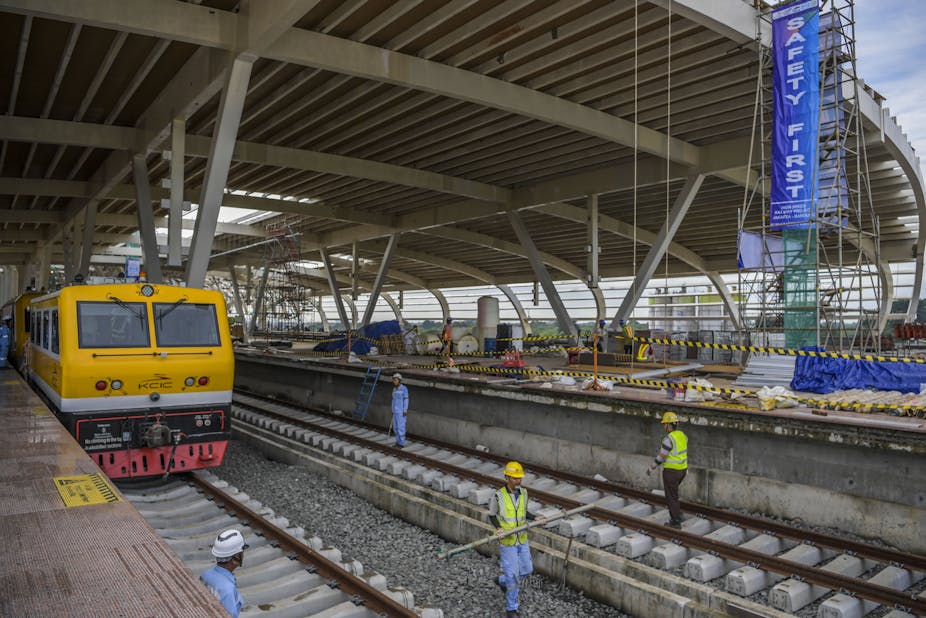Indonesia’s high-speed train project connecting the country’s capital Jakarta and West Java’s capital, Bandung, has encountered another stumble. Following accidents, including one in December that claimed two lives, the China-backed project has hit financial problems. As a result, the cost of the project has swelled by US$ 1.2 billion from the original forecast of $6 billion.
China has asked Indonesia to guarantee to cover the swelling budget.
As researchers focusing on China-Indonesia relations, we suggest the Indonesian government reject the request to avoid detrimental consequences for the country’s economy. Indonesia must learn from Malaysia’s success story in renegotiating project debts financed by China in 2016.
Lessons from Sri Lanka and Uganda
This cost overrun is very similar to Sri Lanka’s failed Hambantota Port development.
Sri Lanka received a $1.3 billion loan from China to modernise the port on the condition that the Chinese Communications Construction Company execute the project.
But Sri Lanka was unable to pay off its debt, which had grown to $8 billion, due to massive levels of corruption. As a result, Sri Lanka leased a 70%-stake in the port to the China Merchant Port company for 99 years to earn $1.12 billion to help fund the country’s balance of payment.
So, in addition to the loan that Sri Lanka had to pay for the Hambantota project, Sri Lanka no longer had the dominant ownership of the project. The majority of profits will go to China Merchant Port, instead.
Another debt issue arose in Uganda’s Entebbe International airport expansion project in 2021. The project received a loan from the Export-Import Bank (EXIM) of China worth $207 million. This loan has a term of 20 years. However, efforts to pay off the debt have faltered.
The financial agreement states that Uganda is required to provide a fully liquid source of collateral in the form of cash deposit that China can unilaterally seize if Uganda is unable to pay off the loan.
In addition, China also demanded all revenues generated from Entebbe International Airport be used to repay the loan on a priority basis. Uganda managed to refuse this request and renegotiate under a less intrusive arrangement, which grants the lender the right to monitor but not control the spending decisions.
Indonesian economists have warned that Indonesia could suffer financially from paying China’s increasing debts for the high-speed train project. If Indonesia doesn’t want to end up with debt problems to those encountered elsewhere, it needs a strategy and it could do worse that take a look at Malaysia’s successful strategy in renegotiating with China.
Malaysia’s renegotiation
Malaysia launched the East Coast Rail Line (ECRL) under Najib Razak’s administration in 2016 at a cost of 65.5 billion ringgit (US$19.6 billion).
The current leadership under Mahathir Mohamad deems the project too expensive, and has contended that it is unclear why many of the cost overruns have occurred. After nine months of repeated negotiations, China agreed to lower the project cost by one-third to 44 billion ringgit.
Malaysia had been using its connections with the United States, Japan and Association of Southeast Asian Nations (ASEAN) during its negotiation with China. Malaysia strengthening bargaining power with this strategy.
Indonesia should use its strategic position as ASEAN’s founding country and this year’s chair to renegotiate with China to reduce the risk of being entangled in debt defaults and suffer from deeper losses.
Recommendations
It is crucial to note that when it comes to Chinese-funded projects, recipient countries are not hapless victims. Rather they actively shape how the projects are implemented and their outcomes.
The wise option for Indonesia is to refuse China’s request to use its state budget as collateral, because it is too risky. Putting the state budget as collateral may result in losses that will eventually put the burden of debt to Indonesian citizens.
We recommend Indonesia to be careful in this project partnership with China and to diversify its country partners in infrastructure projects in the future.


